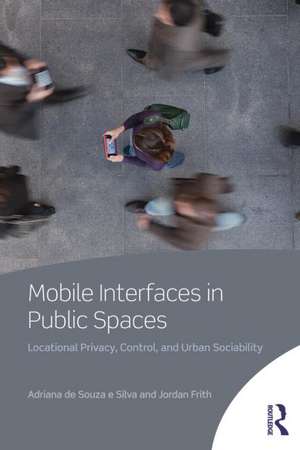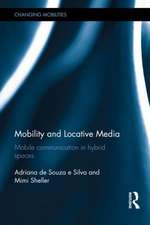Mobile Interfaces in Public Spaces: Locational Privacy, Control, and Urban Sociability
Autor Adriana de Souza e Silva, Jordan Frithen Limba Engleză Paperback – 8 mar 2012
In Mobile Interfaces in Public Spaces, Adriana de Souza E. Silva and Jordan Frith examine these social and spatial changes by framing the development of location-aware technology within the context of other mobile and portable technologies such as the book, the Walkman, the iPod, and the mobile phone. These technologies work as interfaces to public spaces – that is, as symbolic systems that not only filter information but also reshape communication relationships and the environment in which social interaction takes place. Yet rather than detaching people from their surroundings, the authors suggest that location-aware technologies may ultimately strengthen our connections to locations.
| Toate formatele și edițiile | Preț | Express |
|---|---|---|
| Paperback (1) | 416.36 lei 43-57 zile | |
| Taylor & Francis – 8 mar 2012 | 416.36 lei 43-57 zile | |
| Hardback (1) | 1113.25 lei 43-57 zile | |
| Taylor & Francis – 8 mar 2012 | 1113.25 lei 43-57 zile |
Preț: 416.36 lei
Nou
Puncte Express: 625
Preț estimativ în valută:
79.67€ • 83.41$ • 65.92£
79.67€ • 83.41$ • 65.92£
Carte tipărită la comandă
Livrare economică 07-21 aprilie
Preluare comenzi: 021 569.72.76
Specificații
ISBN-13: 9780415506007
ISBN-10: 041550600X
Pagini: 224
Ilustrații: 18 black & white halftones
Dimensiuni: 152 x 229 x 15 mm
Greutate: 0.31 kg
Ediția:New.
Editura: Taylor & Francis
Colecția Routledge
Locul publicării:Oxford, United Kingdom
ISBN-10: 041550600X
Pagini: 224
Ilustrații: 18 black & white halftones
Dimensiuni: 152 x 229 x 15 mm
Greutate: 0.31 kg
Ediția:New.
Editura: Taylor & Francis
Colecția Routledge
Locul publicării:Oxford, United Kingdom
Public țintă
Postgraduate and UndergraduateCuprins
Introduction Part 1: Mobile Media History 1. Personalization 2. Privacy Part 2: Location-Awareness in Public Spaces 3. Mobile Phones 4. Location-Aware Media 5. Control and Personalization 6. Privacy and Surveillance 7. Conclusion
Notă biografică
Adriana de Souza e Silva is Associate Professor in the Department of Communication at North Carolina State University. Her research focuses on how mobile and locative interfaces shape interactions with public spaces and create new forms of sociability. She is the co-editor of Digital Cityscapes: Merging Digital and Urban Playspaces, and co-author of Net-Locality: Why Location Matters in a Networked World,
Jordan Frith is a doctoral candidate in North Carolina State University's Communication, Rhetoric and Digital Media program. His main research interests are locative media and space, particularly how locative media may influence interactions in urban spaces. He has recently been published in the journals Mobilities and Communication, Culture, and Critique.
Jordan Frith is a doctoral candidate in North Carolina State University's Communication, Rhetoric and Digital Media program. His main research interests are locative media and space, particularly how locative media may influence interactions in urban spaces. He has recently been published in the journals Mobilities and Communication, Culture, and Critique.
Recenzii
"Mobile Interfaces in Public Spaces presents an insightful analysis of how mobility affects behavior in public settings, and how public settings affect communication behavior. The authors cast their net broadly, encompassing a range of significant issues including voice and sound, privacy and publicity, and norms and policies." –James E. Katz, Professor of Communication and Director of the Center for Mobile Communication Studies, Rutgers University
'An incredibly clear and useful guide to how mobile technologies are re-shaping our connections to locations and to other people. In considering devices that range from the paperback book to the portable music player to the smartphone as different kinds of "interfaces" with public space, the authors offer great insight into how we filter, control, and manage our relations with spaces and social situations that blur the boundaries between private and public. This is a much-needed contribution to the literature on the new location-based technologies that will become increasingly significant in the coming decade. Consider it an operating manual for the future.' – Mimi Sheller, Professor of Sociology and Director of the Mobilities Research and Policy Center at Drexel University
'Mobile Interfaces in Public Spaces is an historically situated and nuanced account of the role interfaces – from books and Walkmans to iPods and mobile phones – play in our relationships to self, others and everyday urban life. Connecting contemporary practice with classic social theory, this evocative and engaging book is a much needed contribution to this cutting edge field of research.' – Heather A. Horst, RMIT University, Australia
'Highly recommended...In this thought-provoking volume, Silva and Frith consider the impact of location-aware mobile technologies on the human sense of identity, privacy, and control in public spaces. The authors effectively address this emerging area of scholarship, providing insight and discussing relevant theory...Extensively sourced and well written, this engaging title, part of the "Routledge Research in Cultural and Media Studies" series, is a welcome addition to the scholarship in this area.' – CHOICE magazine, D. D. Tritt, University of South Carolina Aiken, USA
'An incredibly clear and useful guide to how mobile technologies are re-shaping our connections to locations and to other people. In considering devices that range from the paperback book to the portable music player to the smartphone as different kinds of "interfaces" with public space, the authors offer great insight into how we filter, control, and manage our relations with spaces and social situations that blur the boundaries between private and public. This is a much-needed contribution to the literature on the new location-based technologies that will become increasingly significant in the coming decade. Consider it an operating manual for the future.' – Mimi Sheller, Professor of Sociology and Director of the Mobilities Research and Policy Center at Drexel University
'Mobile Interfaces in Public Spaces is an historically situated and nuanced account of the role interfaces – from books and Walkmans to iPods and mobile phones – play in our relationships to self, others and everyday urban life. Connecting contemporary practice with classic social theory, this evocative and engaging book is a much needed contribution to this cutting edge field of research.' – Heather A. Horst, RMIT University, Australia
'Highly recommended...In this thought-provoking volume, Silva and Frith consider the impact of location-aware mobile technologies on the human sense of identity, privacy, and control in public spaces. The authors effectively address this emerging area of scholarship, providing insight and discussing relevant theory...Extensively sourced and well written, this engaging title, part of the "Routledge Research in Cultural and Media Studies" series, is a welcome addition to the scholarship in this area.' – CHOICE magazine, D. D. Tritt, University of South Carolina Aiken, USA
Descriere
This book focuses on the social and political implications of using location-aware technologies in public spaces. It aims at analyzing not only how our traditional ideas of public space and social interactions are challenged by the use of these technologies, but also how existing concepts of privacy and sociability determine the design and use of these types of technology. The authors frame the development of location-aware mobile devices within the history of previous media, looking at the way the book, the Walkman, and the iPod have also helped individuals manage their interactions with public spaces. The authors also look at the privacy concerns raised with the use of these earlier forms of media, specifically how they challenged the borders between what is considered private and what is public. In the second half of the book, the authors describe the way in which adding location to mobile communication technologies, such as cell phones, urges us to discuss and reframe social issues such as privacy, surveillance, and exclusion, along with the very concept of public space.













